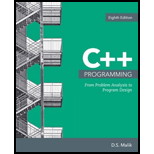
Explanation of Solution
The class dateType has a friend function declared in its definition. The friend function is then defined with two parameters of dateType and a bool return type. The logic of the function is explained with the in-lined comments in the program given below.
//class definition
class dateType
{
//declare the friend function in the class definition
friend bool before(dateType d1, dateType d2);
public:
void setDate(int month, int day, int year);
int getDay() const;
int getMonth() const;
int getYear() const;
void printDate() const;
bool isLeapYear(int) const;
dateType(int month = 1, int day = 1, int year = 1900);
private:
int dMonth; //variable to store the month
int dDay; //variable to store the day
int dYear; //variable to store the year
};
//define the friend function
bool before(dateType d1, dateType d2){
//if the year of first object is strictly less
//than the year of second object return true
//else if the year of the first object is
//strictly more than the year of the second
//object return false else if there is a tie
//then compare the months
if (d1...
Want to see the full answer?
Check out a sample textbook solution
Chapter 13 Solutions
C++ Programming: From Problem Analysis to Program Design
- What IETF protocol is NetFlow associated with? Group of answer choices IPX/SPX IPIX HTTPS SSHarrow_forwardHow can I perform Laplace Transformation when using integration based on this?arrow_forwardWrite an example of a personal reflection of your course. - What you liked about the course. - What you didn’t like about the course. - Suggestions for improvement. Course: Information and Decision Sciences (IDS) The Reflection Paper should be 1 or 2 pages in length.arrow_forward
- using r languagearrow_forwardI need help in explaining how I can demonstrate how the Laplace & Inverse transformations behaves in MATLAB transformation (ex: LIke in graph or something else)arrow_forwardYou have made the Web solution with Node.js. please let me know what problems and benefits I would experience while making the Web solution here, as compared to any other Web solution you have developed in the past. what problems and benefits/things to keep in mind as someone just learningarrow_forward
- PHP is the server-side scripting language. MySQL is used with PHP to store all the data. EXPLAIN in details how to install and run the PHP/MySQL on your computer. List the issues and challenges I may encounter while making this set-up? why I asked: I currently have issues logging into http://localhost/phpmyadmin/ and I tried using the command prompt in administrator to reset the password but I got the error LOCALHOST PORT not found.arrow_forwardHTML defines content, CSS defines layout, and JavaScript adds logic to the website on the client side. EXPLAIN IN DETAIL USING an example.arrow_forwardusing r languangearrow_forward
 C++ Programming: From Problem Analysis to Program...Computer ScienceISBN:9781337102087Author:D. S. MalikPublisher:Cengage Learning
C++ Programming: From Problem Analysis to Program...Computer ScienceISBN:9781337102087Author:D. S. MalikPublisher:Cengage Learning C++ for Engineers and ScientistsComputer ScienceISBN:9781133187844Author:Bronson, Gary J.Publisher:Course Technology Ptr
C++ for Engineers and ScientistsComputer ScienceISBN:9781133187844Author:Bronson, Gary J.Publisher:Course Technology Ptr Microsoft Visual C#Computer ScienceISBN:9781337102100Author:Joyce, Farrell.Publisher:Cengage Learning,
Microsoft Visual C#Computer ScienceISBN:9781337102100Author:Joyce, Farrell.Publisher:Cengage Learning,


